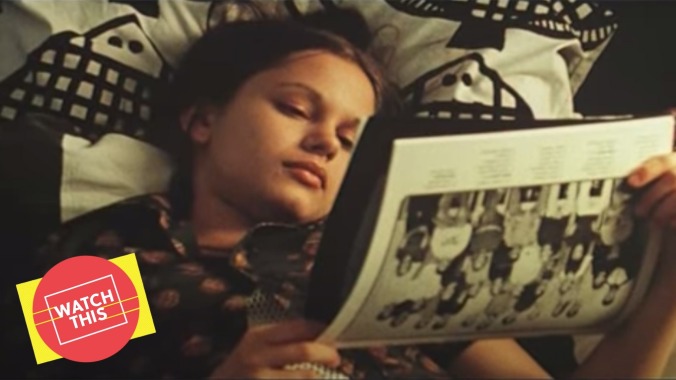By any title, Show Me Love remains a sweetly perceptive coming-out story

Watch This offers movie recommendations inspired by new releases, premieres, current events, or occasionally just our own inscrutable whims. This week: It’s the start of Pride Month, so we’re looking back at some major or influential highlights of queer cinema.
Show Me Love (1998)
In case there was ever doubt that it’s a coming-out story, Lukas Moodysson’s Show Me Love makes it bluntly literal: A character literally comes out of a locked room to reveal their sexual identity to the world. That may sound a bit on the nose, but if there’s one thing the film makes clear, it’s that the act of coming out is rarely easy or obvious. It tends to be a larger-than-life experience, no dramatic embellishment required.
The late ’90s saw a boom of coming-out movies for a new generation of kids, as a wave of talented writers, directors, and actors tackled the topic of discovering one’s sexuality in fin-de-siècle society. From Alex Sichel’s Riot Grrrl-era All Over Me to 1998’s Gen X period piece Edge Of Seventeen, filmmakers found new and uncompromising ways to address a subject that mainstream movies only started broaching about a decade earlier. Increasing awareness of LGBTQ+ rights and realities also increased access to these narratives, as video stores and libraries nationwide made independent cinema available to kids who might not have an arthouse theater in their town—or anyone to talk to about their own struggles. (Unfortunately, the streaming revolution—like the Blu-ray, DVD, and VHS transitions before it—is leaving countless movies behind, in this case vanishing a rich history of queer cinema: Show Me Love is only available to watch via a bootleg copy on YouTube, while All Over Me is completely inaccessible online in any form, unless you want to drop 50 bucks on a used DVD. Hopefully, someone out there can help rectify this depressing situation.)
Though it comes from Sweden, where it was more potently titled Fucking Åmål, Show Me Love has a starkly universal appeal—its story could be perfectly relatable to American teenagers. (The fact that these characters have posters of Nirvana, Morrissey, and other stars of the era on their walls probably doesn’t hurt.) At the start of the film, lonely teen Agnes (Rebecka Liljeberg) has been living in the small town of Åmål for almost a year but still has no real friends to invite to the 16th-birthday party her mother insists on throwing her. Improbably, popular girl Elin (Alexandra Dahlström)—who also happens to be Agnes’ crush—shows up to the party. And though the girls’ first kiss is insincere (Elin, who’s discovered Agnes’ feelings for her in the girl’s diary, callously laughs at her and flees), the two end up developing a genuine romantic connection later in the night. But will Elin be true to her blossoming, reciprocated feelings for Agnes or run from them?
Show Me Love was the first film written and directed by Moodysson, and it established him as an ace chronicler of adolescent angst. (See also 2014’s ebullient making-the-punk-band celebration We Are The Best!) He coaxes beautifully naturalistic performances out of his young stars, capturing the small-town ennui and drop-of-a-dime mood swings that define teenage life for so many. The obstacles to Agnes’ and Elin’s desires are as predictable as they are heartbreaking, with the narcissism and cruelty of kids on full display, even as Moodysson resists making their arc feel pat or generic. (Both Elin and Agnes have their own moments of brutal meanness, and the judgmental friends get empathetic sequences as well.) But there’s a fundamental earnestness to adolescent love, with its absence of experience or caution, that can make it much more exhilarating to witness than a more thoughtful grown-up romance. Show Me Love doesn’t flinch from the messy realities of coming out, but it also delivers a sweetly simple ending that remains one of the more valuable messages for queer youth who had spent much of history thinking no good could come of coming out: It gets better.
Availability: Show Me Love is available to watch for free on YouTube. (Make sure to turn on the English subtitles.)